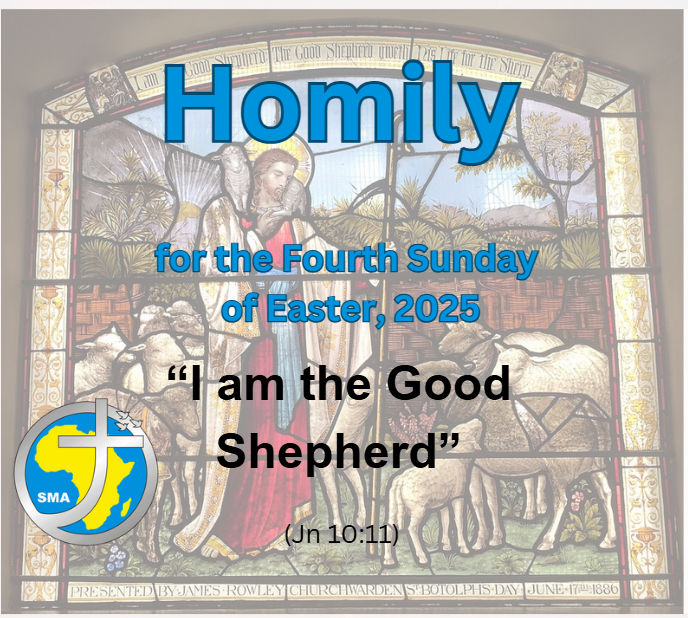Readings: Acts 13: 14, 43-52; Revelation 7:9, 14-17; John 10:27-30
Theme: Jesus, The Good Shepherd
by Fr Michael McCabe SMA
On this day, the World Day of Prayer for Vocations, we are invited to reflect on the meaning of God’s call to leadership in the Church and to pray for vocations. To help us reflect on the meaning of vocation – a call to serve others – the Church, in today’s Gospel, presents us with the figure of Jesus, the Good Shepherd, who not only knows and cares for his sheep, but is ready to give his life for them. As Jesus tells us in today’s gospel reading: ‘I give them eternal life; they will never be lost and no one will ever steal them from me’ (Jn 10:28).
At the time when Jesus lived, there were two kinds of shepherds in Israel. There was the hired hand for whom herding the sheep was just a job. He would move from one flock to another depending on the conditions of service. Since the sheep did not belong to him, he would never dream of risking his life for them. If he saw wolves or thieves approaching, he would flee for dear life and leave the flock to the mercy of the marauders. Then there was the shepherd-owner of the flock who stayed with the same flock all his life. He knew every sheep in his flock individually and had a name for each one – just like farmers in Ireland had individual names for their cows when I was a boy. The shepherd-owner was devoted to his sheep. He knew the one that was likely to lag behind the others on a long trek, and he would lift it up and carry it in his arms. He knew the ones that were likely to stray from the flock and kept his eye out for them when passing through dangerous terrain. When attacked by wolves or thieves, he would fight to protect his sheep and even risk his life for them.
The good shepherd, Jesus tells us, lays own his life for his sheep (cf. Jn 10:11). The expression ‘laying down one’s life’ comes from the practice in Israel of keeping sheep in an enclosed space called a ‘field pen’. In his classic book on The Holy Land, John Kelman tells us that a field pen consisted of a circular stone wall about four feet high with a narrow opening in it. The pen didn’t have a gate. The shepherd himself was the gate. At night the shepherd would lie down across the opening so that the sheep would not wander out, or wolves enter in. Any intruder would literally have to cross over his body.
This background gives us an insight into what Jesus had in mind when he stated, ‘I am the Good Shepherd’ (Jn 10:11). His concern and care for us is like that of the shepherd-owner for his sheep. Like the shepherd, he knows and understands us better than we know ourselves. Jesus cares for his flock, leads them, calls them by name. His sole concern is for their well-being. As he states in today’s gospel reading: ‘My sheep hear my voice; I know them and they follow me’ (Jn 10:27). In the words of our second reading, ‘He will shepherd them and lead them to springs of life-giving water’ (Rev 7:17).
At a time when political leaders and religious leaders distanced themselves from those under their authority, making ‘their authority felt’ and insisting on being served, Jesus modeled a leadership of loving service without conditions or limits. To illustrate what it meant to be a ‘Good Shepherd’, he washed his disciples’ feet – the action of a slave (cf. Jn 13:1-17). The Good Shepherd model of leadership has always been, and still remains, profoundly counter-cultural – even in ecclesial circles! It challenges all who are involved in leadership and pastoral ministry in the Church to imitate the generosity and selflessness of Jesus, and spend themselves in the service of others without counting the cost.
During his twelve years of selfless service as supreme leader of the Church, Pope Francis frequently urged bishops and priests to ‘be joyful, stubborn shepherds who take risks and seek out even those who are most distant from God, in imitation of the Good Shepherd, Jesus Christ’. He added: ‘You must have hearts sufficiently free to set aside your own concerns. You must not live by calculating your gains or counting the hours you have worked. You are not an accountant of the Spirit, but a Good Samaritan who seeks out those in need.” When people see that their leaders are prepared to pour out their lives in loving and caring service, they too will be inspired and empowered to serve one another in love.
I conclude with a sonnet/prayer by the poet Malcolm Guite entitled ‘I am the Good Shepherd’:
When so much shepherding has gone so wrong,
So many pastors hopelessly astray,
The weak so often preyed on by the strong,
So many bruised and broken on the way,
The very name of shepherd seems besmeared,
The fold and flock themselves are torn in half,
The lambs we left to face all we have feared
Are caught between the wasters and the wolf.
Good Shepherd now your flock has need of you,
One finds the fold and ninety-nine are lost
Out in the darkness and the icy dew,
And no one knows how long this night will last.
Restore us; call us back to you by name,
And by your life laid down, redeem our shame.
Listen to an alternative Homily by Fr. Tom Casey SMA:

